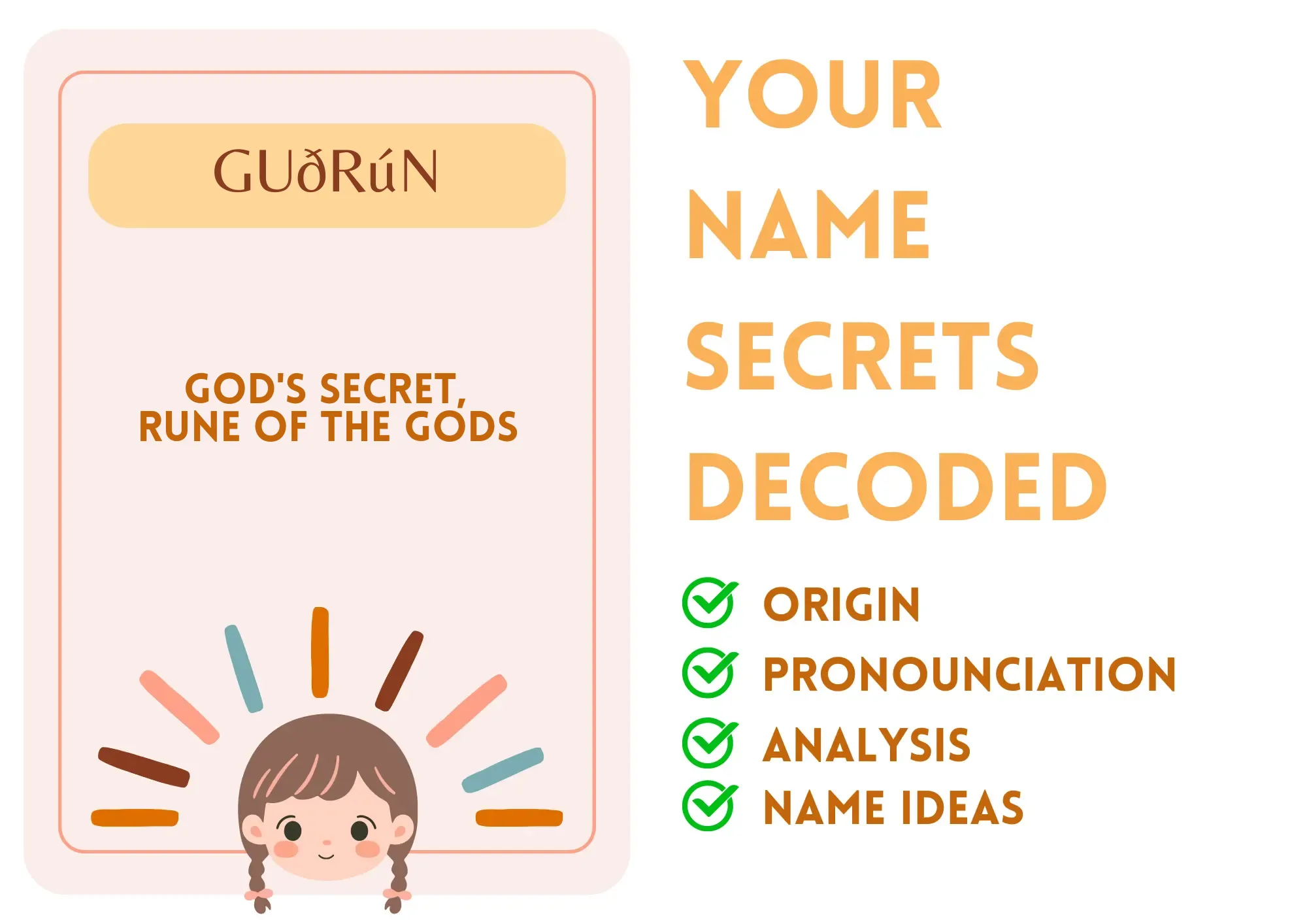
Guðrún
Guðrún is a beautiful and culturally significant name of Old Norse origin, often interpreted as 'God's secret' or 'the rune of the gods.' It has traditionally been a popular name in Iceland and among those with Scandinavian heritage. Primarily associated with females, this name holds a deep connection to Norse mythology and the Viking Age.
Guðrún is notable for its historical significance in the Norse sagas, most famously in the Þiðranda saga and Guðrúnarkviða, where the character Guðrún is portrayed as a strong and resilient woman, navigating love, loss, and destiny. The name suggests a person of depth and mystery, which resonates positively with many.
Commonly used in Icelandic culture, Guðrún is often regarded fondly, evoking feelings of strength and cultural pride. Its unique structure and sounds may pose some challenges for non-Icelandic speakers, but it appeals to those interested in Norse history and mythology.
Basic Information
Gender: Girl
Sounds Like: GUTH-roon
Pronunciation Explanation: The first syllable 'Guð' rhymes with 'hood,' and the second syllable 'rún' sounds like 'roon.' The 'ð' is a soft th sound, like in 'the.'
Summary and Meaning
Meaning: God's secret, rune of the gods
Origin: Old Norse, specifically of Icelandic origin linked to Norse mythology.
Usage: Guðrún is traditionally a female name, consistently used for girls in Iceland and some other Northern European cultures.
Name Number (Chaldean)
Name Number (Pythagorean)
Popularity (Global Rank)
Overall: 17867
Girls: 44554
Most Popular in
Religious and Cultural Significance
Religion: Norse
Background: In Norse culture, Guðrún carries a spiritual connotation as it ties into myths surrounding the gods and runes, making it significant in historical context.
Cultural Significance: This name reflects the depth of Norse literary heritage and is often chosen for its connection to powerful female figures in mythology.
Historical Significance: The name Guðrún is prominently featured in Norse sagas, especially the poetic Edda, symbolizing resilience and strength amidst trials.
Popular Culture
Literature and Mythology: Guðrún appears in various medieval sagas, renowned for her tragic yet powerful story arcs, reflecting often upon themes of destiny and loss.
Movies and Television: Various adaptations of Norse mythology and Viking tales included characters named Guðrún, depicting her as a pivotal character with strong moral and emotional elements.
Feelings and Perceptions
Perception: Guðrún is generally viewed positively, embodying strength, depth, and cultural significance, reflecting admiration for its historical roots. It is cherished among those with an affinity for Norse legends.
Positive Feelings: Strong, unique, historical, enigmatic, feminine, powerful.
Negative Feelings: Might be perceived as difficult to pronounce or unfamiliar to non-Nordic individuals.
Practical Considerations
Ease of Writing and Calling: Guðrún consists of six letters and two syllables. While it may be manageable for Icelanders, the special character 'ð' can confuse those unfamiliar with it, making the pronunciation slightly challenging outside its cultural context.
Common Typos and Misspellings: Gudrun,Gudrune,Gudrunn,Gutherun
Common Nicknames: Gudi,Runy,Runa
Guðrún Popularity
Guðrún Usage and Popularity By Country
| Country | Rank (Overall) |
|---|---|
| Iceland | 3 |
| Latvia | 4082 |
| Malawi | 5294 |
| Norway | 7037 |
| Finland | 10118 |
| Sweden | 12706 |
| Ireland | 23749 |
| Belgium | 30171 |
| New Zealand | 33723 |
| Netherlands | 34656 |
Guðrún Usage and Popularity By City
| City | Rank (Overall) |
|---|
Compatibility Analysis
Famous Persons Named Guðrún
Related Names
Similar Sounding Names:
Gunnar,Grettir,Guðni